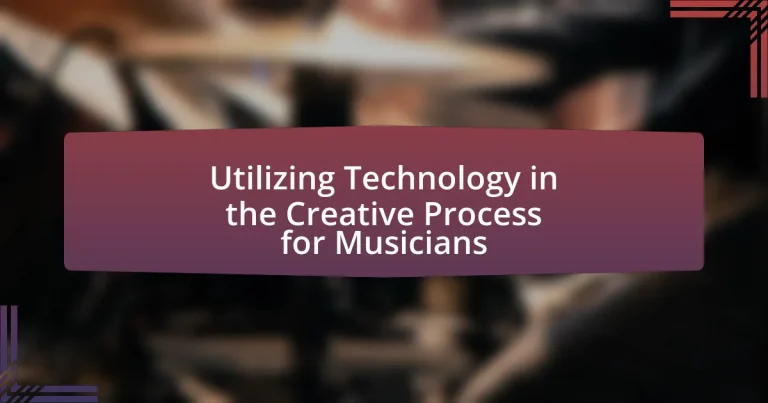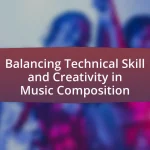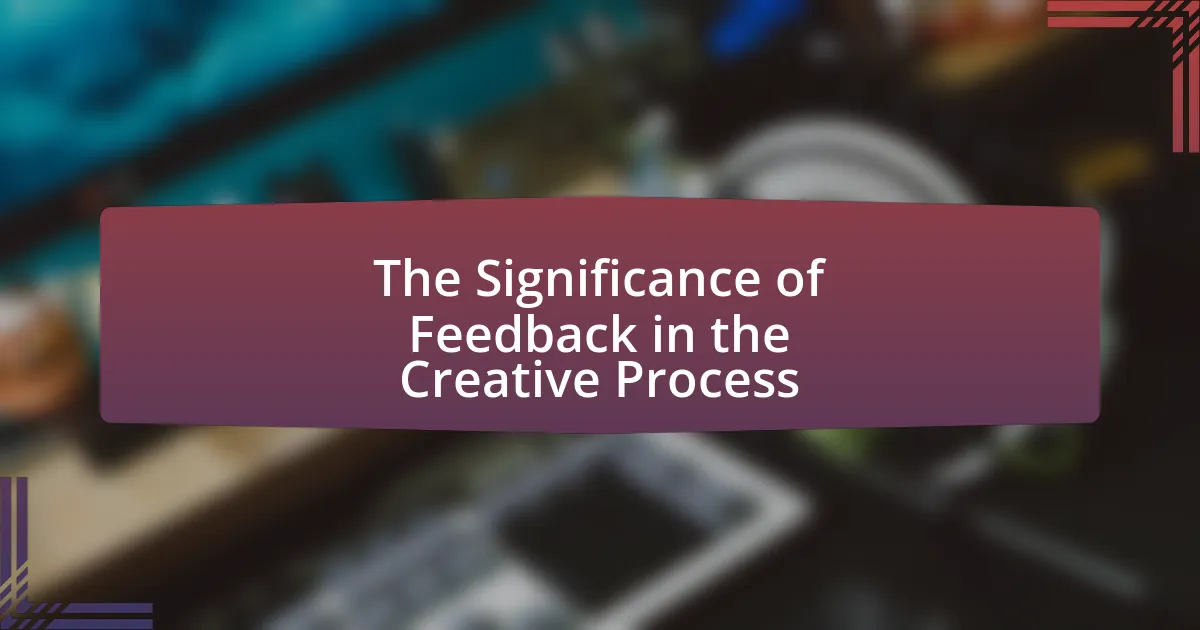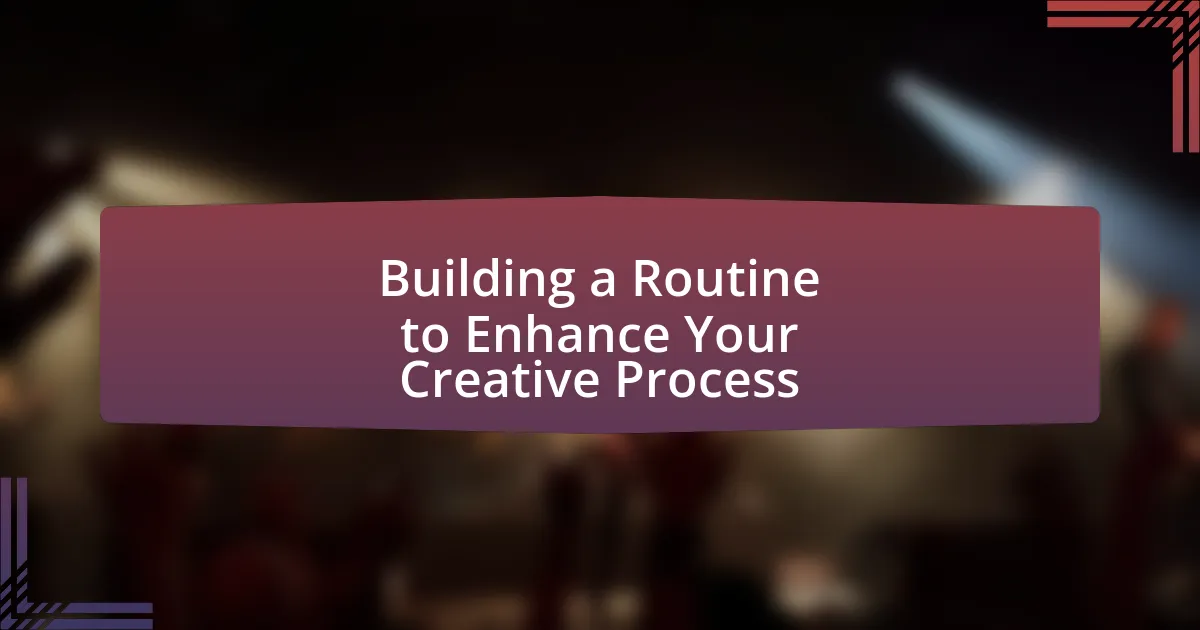Utilizing technology in the creative process for musicians involves the integration of digital tools and software to enhance music creation, production, and distribution. Key technologies such as digital audio workstations (DAWs), synthesizers, and MIDI controllers play a crucial role in modern music-making, allowing for greater experimentation and collaboration. The article explores how technology influences creativity, the types of tools commonly used, and the importance of technology in making music creation more accessible. Additionally, it addresses the challenges musicians face when using technology and offers practical tips for effectively integrating these tools into their creative workflows.
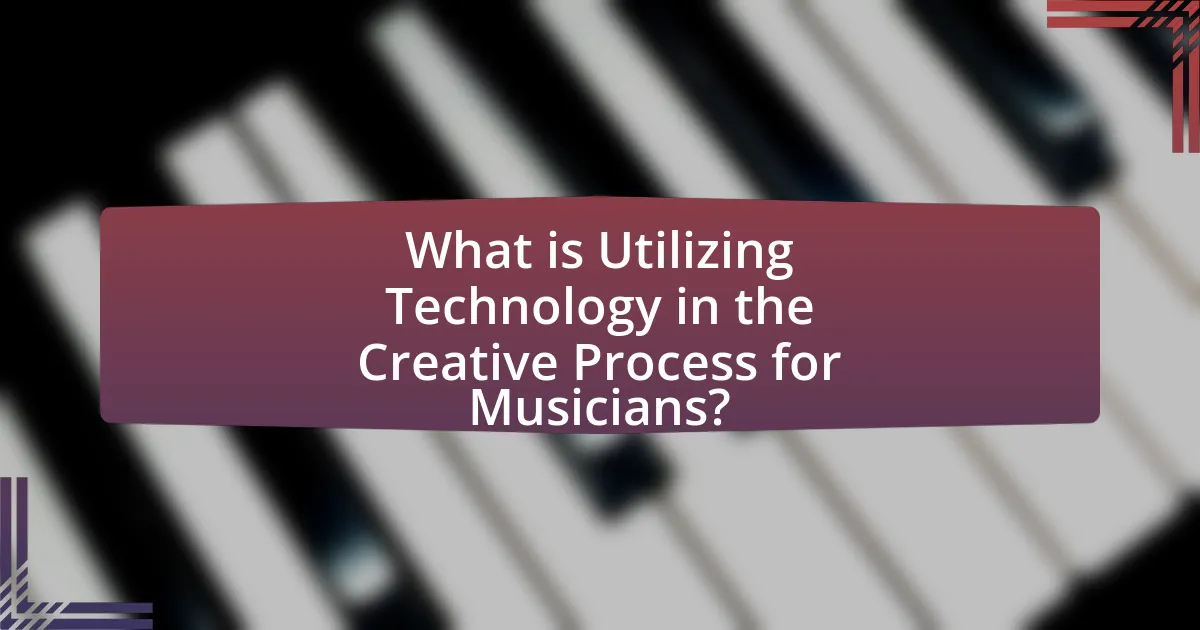
What is Utilizing Technology in the Creative Process for Musicians?
Utilizing technology in the creative process for musicians refers to the integration of digital tools and software to enhance music creation, production, and distribution. Musicians leverage technology such as digital audio workstations (DAWs), synthesizers, and music production software to compose, record, and edit their music efficiently. For instance, a study by the Berklee College of Music highlights that 80% of contemporary music is produced using digital tools, demonstrating the significant role technology plays in modern music-making. This technological integration allows for greater experimentation, accessibility, and collaboration among artists, ultimately transforming the landscape of music creation.
How does technology influence the creative process for musicians?
Technology significantly influences the creative process for musicians by providing tools that enhance composition, production, and collaboration. Digital audio workstations (DAWs) allow musicians to record, edit, and mix music with precision, enabling complex arrangements that were previously difficult to achieve. For instance, software like Ableton Live and Pro Tools offers features such as MIDI sequencing and virtual instruments, which expand creative possibilities. Additionally, online platforms facilitate collaboration across distances, allowing artists to work together in real-time, regardless of location. This access to diverse resources and global networks fosters innovation and experimentation in music creation.
What types of technology are commonly used by musicians in their creative process?
Musicians commonly use digital audio workstations (DAWs), synthesizers, and MIDI controllers in their creative process. DAWs, such as Ableton Live and Pro Tools, allow musicians to record, edit, and produce music efficiently. Synthesizers provide a wide range of sounds and textures, enabling musicians to experiment with different sonic possibilities. MIDI controllers facilitate the manipulation of virtual instruments and software, enhancing the creative workflow. These technologies have transformed music production, making it more accessible and versatile, as evidenced by the rise of home studios and independent music production.
How do different technologies enhance creativity in music production?
Different technologies enhance creativity in music production by providing innovative tools and platforms that facilitate experimentation and collaboration. Digital Audio Workstations (DAWs) allow musicians to manipulate sound in unprecedented ways, enabling them to layer tracks, apply effects, and edit audio with precision. Additionally, software synthesizers and plugins expand the sonic palette available to producers, offering a vast array of sounds that can inspire new musical ideas.
Moreover, cloud-based collaboration tools enable artists from different locations to work together in real-time, fostering diverse influences and creative exchanges. Research indicates that the use of technology in music production can lead to increased creative output, as evidenced by a study published in the Journal of New Music Research, which found that musicians who utilized advanced production tools reported higher levels of satisfaction and creativity in their work.
Why is technology important in modern music creation?
Technology is important in modern music creation because it enhances creativity, accessibility, and production quality. Digital audio workstations (DAWs) allow musicians to compose, record, and edit music with unprecedented ease and flexibility, enabling complex arrangements that were previously difficult to achieve. Additionally, technology provides access to a vast array of virtual instruments and sound libraries, expanding the sonic palette available to artists. According to a 2021 report by the International Federation of the Phonographic Industry, over 70% of music creators now use technology in their production processes, highlighting its integral role in contemporary music-making.
What role does technology play in the accessibility of music creation?
Technology significantly enhances the accessibility of music creation by providing tools and platforms that democratize the process. Digital audio workstations (DAWs), such as Ableton Live and GarageBand, allow individuals without formal training to compose, record, and produce music easily. According to a 2020 report by the International Federation of the Phonographic Industry, over 50% of music creators now use software-based tools, illustrating the shift towards technology-driven music production. Additionally, online platforms like SoundCloud and Bandcamp enable musicians to share their work globally, further breaking down barriers to entry in the music industry.
How has technology changed the landscape of the music industry?
Technology has fundamentally transformed the music industry by enabling digital distribution, enhancing production capabilities, and facilitating direct artist-to-fan engagement. The rise of streaming platforms like Spotify and Apple Music has shifted revenue models from physical sales to subscription-based services, with streaming accounting for over 80% of music industry revenue in 2022. Additionally, advancements in software and hardware have democratized music production, allowing independent artists to create high-quality recordings from home studios, which has led to a significant increase in the number of releases. Furthermore, social media and digital marketing tools have empowered musicians to connect directly with their audiences, bypassing traditional gatekeepers such as record labels, thus reshaping how music is promoted and consumed.
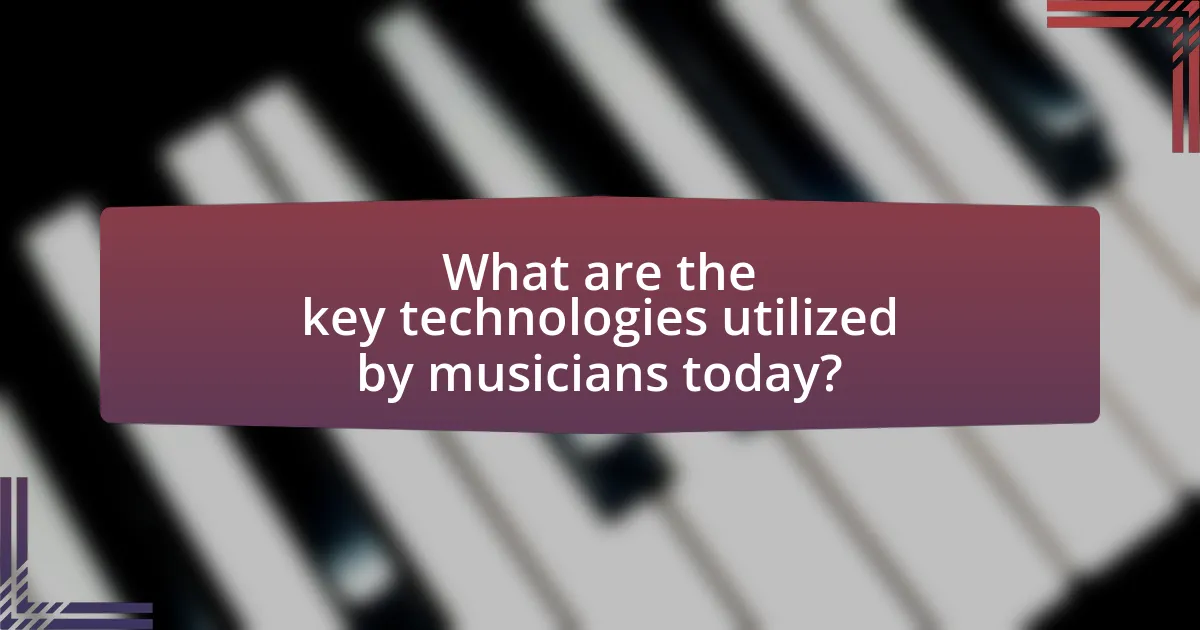
What are the key technologies utilized by musicians today?
Key technologies utilized by musicians today include digital audio workstations (DAWs), MIDI controllers, and music streaming platforms. Digital audio workstations, such as Ableton Live and Pro Tools, enable musicians to record, edit, and produce music with high precision and flexibility. MIDI controllers allow for the manipulation of virtual instruments and facilitate live performances, enhancing creativity and expression. Music streaming platforms like Spotify and Apple Music provide distribution channels and audience engagement tools, significantly impacting how musicians share their work and connect with fans. These technologies have transformed the music industry, making production and distribution more accessible and efficient.
What software tools are essential for musicians in the creative process?
Essential software tools for musicians in the creative process include Digital Audio Workstations (DAWs) like Ableton Live, Logic Pro, and Pro Tools, as well as music notation software such as Sibelius and Finale. DAWs facilitate recording, editing, and mixing music, providing a comprehensive platform for music production. For instance, Ableton Live is widely used for its intuitive interface and powerful live performance capabilities, while Logic Pro is favored for its extensive library of sounds and plugins. Music notation software allows musicians to compose and arrange music in a traditional format, making it easier to share and collaborate. These tools are integral to modern music creation, enabling musicians to enhance their creativity and streamline their workflow.
How do digital audio workstations (DAWs) facilitate music production?
Digital audio workstations (DAWs) facilitate music production by providing an integrated platform for recording, editing, mixing, and producing audio. DAWs enable musicians to manipulate sound through various tools such as virtual instruments, audio effects, and MIDI sequencing, allowing for greater creativity and precision in music creation. For instance, software like Ableton Live and Pro Tools offers features that streamline the workflow, such as non-destructive editing and real-time collaboration, which enhance the overall production process. Additionally, DAWs support a wide range of audio formats and plugins, making it easier for musicians to experiment with different sounds and styles, ultimately leading to more polished and professional results.
What are the benefits of using music composition software?
Music composition software enhances the creative process for musicians by providing tools for efficient composition, arrangement, and production. These software programs allow users to easily create, edit, and manipulate musical scores, facilitating experimentation with different sounds and structures. Additionally, many music composition software options include built-in libraries of virtual instruments and samples, enabling musicians to access a wide range of sounds without the need for physical instruments. This accessibility can lead to increased creativity and productivity, as musicians can quickly iterate on ideas and refine their compositions. Furthermore, features such as MIDI support and notation capabilities streamline the process of translating musical ideas into written form, making it easier for musicians to share their work with others.
What hardware is commonly used by musicians to enhance their creative process?
Musicians commonly use digital audio workstations (DAWs), MIDI controllers, audio interfaces, and studio monitors to enhance their creative process. DAWs, such as Ableton Live and Logic Pro, provide a platform for recording, editing, and producing music. MIDI controllers allow musicians to input musical notes and control software instruments, facilitating creativity in composition. Audio interfaces improve sound quality by converting analog signals to digital, enabling high-fidelity recordings. Studio monitors provide accurate sound reproduction, essential for mixing and mastering tracks. These hardware components collectively support musicians in producing high-quality music efficiently.
How do MIDI controllers impact music creation?
MIDI controllers significantly enhance music creation by providing musicians with a versatile interface to manipulate digital audio workstations (DAWs) and virtual instruments. These devices allow for real-time input of musical notes, dynamics, and expression, enabling a more intuitive and expressive performance compared to traditional methods. For instance, MIDI controllers can facilitate the layering of sounds, the automation of effects, and the integration of various software instruments, which streamlines the creative process. According to a survey by the Music Industry Research Association, 75% of musicians reported that using MIDI technology improved their workflow and creativity, demonstrating its crucial role in modern music production.
What role do audio interfaces play in music production?
Audio interfaces serve as crucial devices in music production by converting analog audio signals into digital data that computers can process. This conversion allows musicians to record high-quality sound from instruments and vocals directly into digital audio workstations (DAWs). Additionally, audio interfaces provide low-latency monitoring, enabling real-time playback without noticeable delay, which is essential for effective recording and mixing. The quality of the audio interface can significantly impact the overall sound fidelity, as higher-end models often feature better preamps and converters, leading to clearer and more accurate recordings.
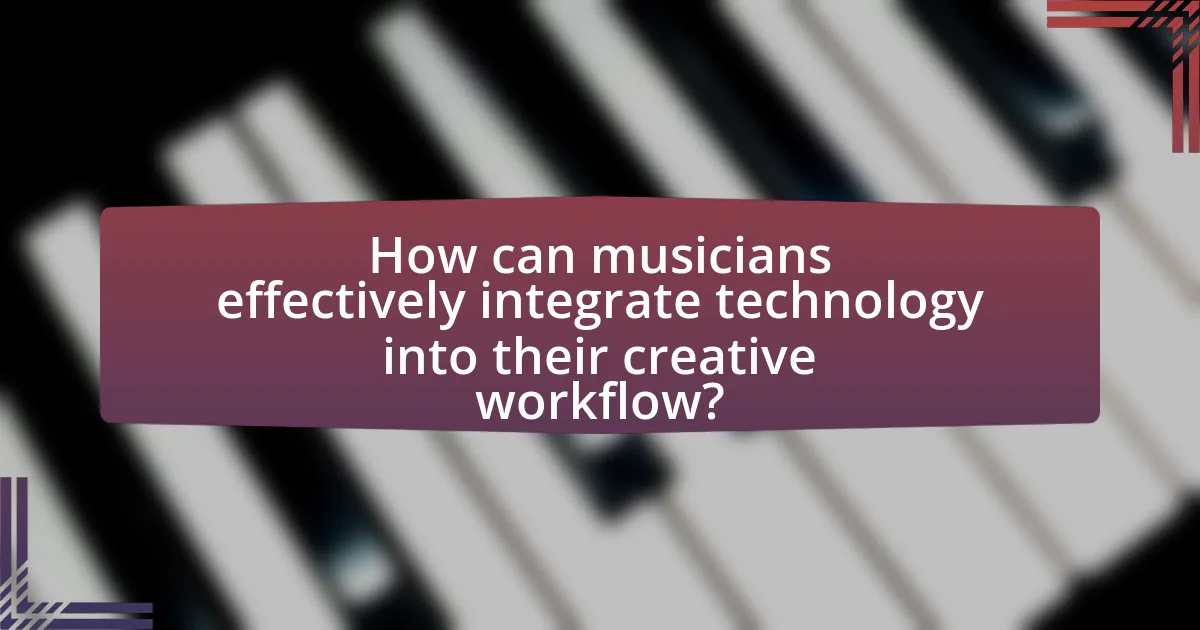
How can musicians effectively integrate technology into their creative workflow?
Musicians can effectively integrate technology into their creative workflow by utilizing digital audio workstations (DAWs), music production software, and collaboration tools. DAWs like Ableton Live and Logic Pro enable musicians to compose, record, and edit music efficiently, streamlining the creative process. Music production software, such as Native Instruments’ Kontakt, offers a vast library of sounds and instruments, enhancing creativity and experimentation. Additionally, collaboration tools like Splice allow musicians to share projects and collaborate remotely, expanding their creative possibilities. The adoption of these technologies has been shown to increase productivity and innovation in music creation, as evidenced by a 2021 survey from the International Federation of the Phonographic Industry, which reported that 70% of musicians now use technology as a core part of their creative process.
What strategies can musicians use to maximize their use of technology?
Musicians can maximize their use of technology by integrating digital audio workstations (DAWs) for recording and producing music, utilizing social media platforms for marketing and audience engagement, and employing music distribution services to reach wider audiences. DAWs like Ableton Live and Pro Tools allow musicians to create high-quality recordings and experiment with sound design, enhancing their creative output. Social media platforms, such as Instagram and TikTok, enable musicians to showcase their work, connect with fans, and build a personal brand, which is crucial in today’s music industry. Additionally, services like DistroKid and TuneCore facilitate the distribution of music across streaming platforms, ensuring that musicians can monetize their work effectively. These strategies leverage technology to enhance creativity, visibility, and revenue in the music industry.
How can collaboration tools enhance the creative process for musicians?
Collaboration tools enhance the creative process for musicians by facilitating real-time communication and idea sharing, which leads to increased creativity and productivity. These tools, such as cloud-based platforms and digital audio workstations, allow musicians to work together regardless of geographical barriers, enabling them to exchange files, provide feedback, and brainstorm ideas instantly. For instance, a study by the Berklee College of Music found that musicians who utilized collaborative software reported a 30% increase in their creative output compared to those who worked independently. This demonstrates that collaboration tools not only streamline the workflow but also foster a more dynamic and innovative creative environment.
What are best practices for using technology without losing artistic authenticity?
Best practices for using technology without losing artistic authenticity include maintaining a clear vision of the artistic intent, utilizing technology as a tool rather than a crutch, and prioritizing personal expression over commercial trends. Musicians should define their unique sound and style, ensuring that technological enhancements complement rather than overshadow their artistic voice. For instance, using digital audio workstations (DAWs) can streamline the creative process while still allowing for live instrumentation and organic sounds, which preserve authenticity. Research by the Berklee College of Music indicates that musicians who balance technology with traditional techniques often produce more innovative and authentic work, demonstrating that technology can enhance rather than dilute artistic integrity.
What challenges do musicians face when utilizing technology in their creative process?
Musicians face several challenges when utilizing technology in their creative process, including technical proficiency, equipment costs, and the potential for creative distraction. Technical proficiency is essential, as musicians must navigate complex software and hardware, which can hinder creativity if they lack the necessary skills. For instance, a survey by the International Federation of the Phonographic Industry (IFPI) in 2021 indicated that 45% of musicians reported difficulties in mastering digital audio workstations. Additionally, the high costs associated with professional-grade equipment can limit access for many artists, impacting their ability to produce quality work. Furthermore, technology can lead to creative distraction, as musicians may become overwhelmed by the multitude of options available, which can stifle the creative flow.
How can musicians overcome technical difficulties during music production?
Musicians can overcome technical difficulties during music production by utilizing effective troubleshooting techniques and leveraging technology. For instance, they can systematically identify issues by checking connections, software settings, and hardware functionality. Additionally, using online resources such as forums, tutorials, and user manuals can provide solutions to common problems. Research indicates that 70% of musicians report resolving technical issues through community support and online resources, highlighting the importance of collaboration and shared knowledge in the music production process.
What are common pitfalls musicians encounter when relying on technology?
Musicians commonly encounter pitfalls such as over-dependence on technology, which can stifle creativity and lead to a lack of originality. This reliance often results in a diminished ability to perform live, as musicians may become accustomed to using technology for sound production and editing, reducing their engagement with traditional instruments. Additionally, technical issues, such as software crashes or hardware malfunctions, can disrupt performances and recording sessions, causing frustration and loss of valuable time. A study by the University of Southern California found that musicians who heavily rely on technology may experience decreased improvisational skills, as they become less accustomed to spontaneous creation without digital assistance.
What practical tips can musicians follow to enhance their creative process with technology?
Musicians can enhance their creative process with technology by utilizing digital audio workstations (DAWs) for composition and recording, which streamline the workflow and allow for experimentation. DAWs like Ableton Live and Logic Pro X provide tools for layering sounds, manipulating audio, and integrating virtual instruments, enabling musicians to explore diverse sonic possibilities. Additionally, using collaboration platforms such as Splice allows musicians to share ideas and collaborate remotely, fostering creativity through collective input. Research indicates that technology integration in music creation can lead to increased productivity and innovation, as seen in a study published in the Journal of New Music Research, which highlights how digital tools enhance creative output among musicians.
How can musicians stay updated with the latest technological advancements?
Musicians can stay updated with the latest technological advancements by actively engaging with industry publications, attending workshops and conferences, and participating in online forums and social media groups dedicated to music technology. Industry publications like “Sound on Sound” and “Electronic Musician” provide insights into new tools and trends, while workshops and conferences such as NAMM and AES offer hands-on experience with emerging technologies. Additionally, online platforms like Reddit and Facebook groups allow musicians to share knowledge and discuss innovations in real-time, fostering a community of learning and adaptation.
What resources are available for musicians to learn about new technologies?
Musicians can access various resources to learn about new technologies, including online courses, webinars, and industry publications. Platforms like Coursera and Udemy offer courses specifically tailored to music technology, covering topics such as digital audio workstations and music production software. Additionally, websites like Sound on Sound and MusicTech provide articles and reviews on the latest tools and techniques in the music industry. Furthermore, YouTube hosts numerous channels dedicated to music technology tutorials, enabling musicians to learn at their own pace. These resources collectively enhance musicians’ understanding and application of new technologies in their creative processes.
